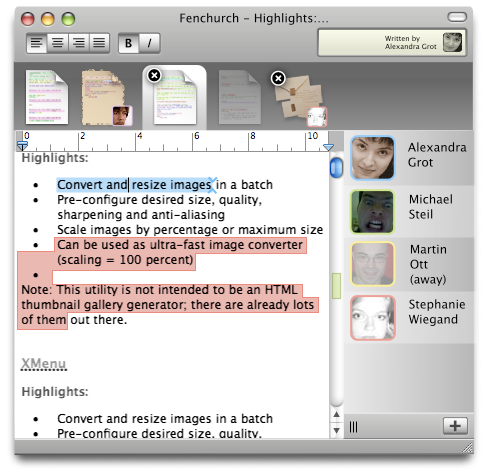The State of TheCodingMonkeys
As announced indirectly via the new website I'm back at the helm at TheCodingMonkeys.
The first public act in that role was to announce that we have to remove Carcassonne from sale beginning March 1st 2020 (grab it while you can, it's awesome!), which is a very emotional good bye for me. On release in 2010, Carcassonne was a huge milestone for TheCodingMonkeys as a company: It was the first App for us that really solidified that we made it as a company. To me personally it was kind of the perfect storm: Being allowed to make the best UI I could, on a medium I loved (iPhone/iPad) in a genre I grew up with (Boardgames). And while stressful, nerve-wrecking, and financially putting us to the limits, it succeeded in more ways that we could dream of.
All of this brought me to rewatch @cabel's fantastic XOXO talk and think about the potential endings. And I thoroughly decided against a "fading out" .
So what is next?
In a first wave with the kind help of @ellduin we put on some well deserved maintenance. We did an update Lost Cities to restore Voice over functionality and also improve the basics on iPhone X Max sizes. We also took the risk to do a last but deserved update to Carcassonne to fully support the whole range of iPad screen estates.
SubEthaEdit is open source and healthy, and will see some additional support this year.
On the games front we're happy to announce the first part of @sightwise's hope will be fulfilled really soon. We are very excited about it, and happy how it turned out. But as the german saying goes: "Erst Ei, dann Gack!" (roughly: first lay the egg, and only then you squawk).
There is also more stuff being set in motion. So stay tuned – I, for one, am looking forward to this reboot of TheCodingMonkeys.
The Sad State of the iPhone/iPad UI ⚓
John Gruber in The iPad Awkwardly Turns 10:
As things stand today, I get a phone call from my mom once a month or so because she’s accidentally gotten Safari into split-screen mode when tapping links in Mail or Messages and can’t get out.
Amen.
Sadly the Apple platform departed from being an easy thing to recommend and give to anyone disregarding of computer experience. Instead it morphed into something that has many quirks that are hard to explain and discover, and sometimes even hard to be the helpline for. Essentially this trend started since iOS 7 and never reversed.
One of the other symptoms of this is that you no longer can hand your iPad to a toddler without putting it into guided access. Otherwise they just trigger a lot of weird app switching based behavior.
I'm wondering if Apple will be able to turn this around again. Sometimes I'm also wondering if Apple as a whole is even still interested in this. Or if it is just my own foolish desire for tech to be better suited to humans of any computer literacy.
Apple Arcade vs. Slot Machines
When I left TheCodingMonkeys for my journey at Apple, my last post on this blog was Slot Machines, bemoaning the shift to free to play games in the App Store.
Although this was 4 years ago, nothing much has changed in that area since. In fact, it got worse. It is ironic to see that Apple was and is a very willing participant. As platform owner it has the full power to change the rules, which is clearly visible in other areas, just look at porn and politics.
For those who remember: with the introduction of in-app purchases in 2009, Apple had the customer at heart and made it explicitly clear that “Free apps remain free”.
Nowadays, with the staggering amount of money they make from those in-app purchases, I think they painted themselves in a 'Revenue Corner'. Probably not one to easily get out of without a significant drop in their services category, stock price, et cetera.
However, they could change the rules, and they should, but clearly for years now they have chosen not to. I would argue that decision was quite short sighted and made both iOS and the App Store a worse place for it.
Now fast forward to their latest approach: Arcade – essentially an attempt to pull all games outside that casual, slot-machine-style genre into their own Netflix-style curated subscription service. There are multiple reasons why I think that is a bad idea, to name a few:
- Exclusivity: I don't want platform exclusive games, especially not the kind of independent games they are going for. That is unhelpful to the eco-system.
- Curation: I don't want Apple to be the kingmaker, influencing and deciding which kind of games they put in there.
- Independent Games: I think this will essentially destroy what is left from the market for paid games out there, both in terms of people buying as well as in terms of marketing. The App Store app will certainly rank Arcade ahead of other games in the store.
- Apple's track record: Just take Game Center, Game Controllers, SpriteKit and tv as examples on how Apple handles the games sector.
Lastly, I do think it is worth calling out the two major games they put on stage on the last two iOS Keynotes. I do see them as further evidence how arbitrary and undecided their direction in the games sector is.
Blades - Bethesda
Announced in the 2018 Keynote, The Elder Scrolls: Blades has been in Early Access for quite a while, accessible exclusively to users with a Bethesda account (although recently, that requirement was removed).
While Blades is a nice example of a complex, good looking 3D engine on mobile, it sadly falls squarely into the slot machine genre. For example, many items in the game drop as loot boxes that take a certain amount of time to open and reveal their contents. Of course, spending real money allows you to speed that up.
Sky - thatgamecompany
The still to be released Sky, from the terrific makers of Journey was announced at the 2017 iPhone reveal keynote. As it turns out, Apple heavily pushed thatgamecompany to make that game free to play:
“They were concerned about our business model, because they’d seen a big decline in people’s willingness to pay for a game that comes with a huge price.” […] Just when the game was ready for its final spit and polish, Chen was told he should consider making Sky a free-to-start game.
It is quite a shame that Apple is so confused on what they want to do in the games sector. The iOS devices are so powerful, and the potential is really great. Maybe at least the developers in the Arcade program currently do have good working/funding conditions, so that might be worth something.
SubEthaEdit 5 – Now free and open source!
The new version 5 of SubEthaEdit, the Apple Design Award winning text editor for macOS, is now available free of charge in the App Store and as direct download. The complete source code with history going back 15 years is also available under the MIT License.
This release fills me with great pride and joy. SubEthaEdit always has a special place in my heart. It is where my journey as a developer in the Apple ecosystem started. I owe it the position I am in today. This connection is why I'm taking the time to maintain it again and try to lead it towards a long lasting future. Therefore I think it is worthwhile looking at how everything came together.
History
It all started with the initial set of peers at our university at the end of 2002: Ulrich Bauer, Martin Ott, Martin Pittenauer and me. As university students we wanted to build something real. So we searched for a project to grow into a fully grown app. Motivated by the Apple Design Awards competition, we challenged ourselves with a fitting deadline to do submit an entry.
At that point in time there weren't many good native text editors on the platform, so doing a general purpose text editor was always an aspiration of mine. I had recently switched from my old Acorn RiscPC over to the Mac, and was really missing my then beloved StrongEd (fair warning that website is quite a sight, as sadly most of the RiscOS ecosystem is and almost always was in terms of style).
I was playing around with the existing text editors, but BBEdit really wasn't for me (and at this time very Carbon, and as such looked dated and did not integrate too smoothly into the new OS X). Personally I went with MacroMedia's Dreamweaver as the least bad option for my web development work.
Luckily one of us dug up an old Xerox Parc Paper that showed how latency free live collaboration can be done. At that time it fit perfectly with the newly released Bonjour technology to allow for networking without configuration between Macs. That was super exciting and we quickly got to a point where we could see this technology as viable and so we went on to build our application.
It was with great joy that we submitted our freely available work, then named Hydra, to the awards, and with even more joy that we won in the student category we applied in.
At that time we didn't charge any money for it. Only at the end of our university careers, the three remaining of us started out our luck as TheCodingMonkeys to live the dream of a Mac indie studio. We all started out doing this part time, the transition from free software to paid shareware did not support more than one person at that time. And while it was fantastic to see SubEthaEdit being used in conferences all over the world, the financial aspects weren't looking great for us.
Marketing wise we shoehorned ourselves into the collaborative aspects, and failed to communicate the fact that SubEthaEdit was a great general purpose text editor of its own right. Worse, the commercial start of SubEthaEdit was overshadowed by the then not yet released TextMate. This was mainly based on David Heinemeier Hansson's well deserved hype of the initial ruby on rails videos featuring it. So we lost the race for the second most popular text editor on the platform (BBEdit still got the first place because of Mac users loyalty and steady development), and therefore the commercial success too.





SubEthaEdit icon history. Unused initial draft, Hydra, SubEthaEdit 2.x, 3.x-4.x, now.
It was at this point that we began struggling a little. While we had enough success to sustain one person, we were not on track to support more than that. Developing and maintaining SubEthaEdit easily consumed most of our time though. It is by that fact, that we all had still day jobs. And while we dabbled in other product ideas (one of the bigger ones a more creative writing based collaboration tool codenamed 'Fenchurch') we didn't get to produce any.

Fenchurch prototype mockup.
Instead we got another lucky break. The great folks at Panic were planning their then secret Coda, and were looking for something they could base their editing engine on. And that influx of financial support was what enabled us to become a real working company. We are forever grateful to Panic for this, as they essentially gave us this opportunity. This was the point in time when Martin Ott, our third co-founder left us, and we started venturing to build Carcassonne for iOS. Another project of mine that was very close to my heart. I have been a board game geek from my early teens on, and joining this with my professional world was just a fantastic opportunity. It also gave me the opportunity to do real production work with Erlang.
The success of Carcassonne also had a somewhat unfortunate side effect for us: With still no real viable long term business story for SubEthaEdit it moved more and more on the back burner. We still maintained it and brought it up to the App Store eventually, but sadly it couldn't prove its financial viability. A big shout out goes to Lisa Brodner and Michael Ehrmann, who took the bulk of the work to create the 4.x releases.
And while it served us well, even for our own development – SubEthaEdit was our main editor to develop it, in the times of Project Builder with external editor support – it did not plant roots in any specific community. And with Xcode slowly getting better, moving to the single window layout only and providing all the Project aware metadata we couldn't, even our own top use case went away. However, we are still very fond of it and use it for all things scripting and of course text creation and collaboration.
Fast forwarding to 4 years ago, I left TheCodingMonkeys to try my luck in the US working for UIKit at Apple while Martin Pittenauer took over the company. It was with both surprise and delight that I experienced how SubEthaEdit still resonated with many of my colleagues there. Even with the success of Carcassonne, SubEthaEdit seemed to have been the product that was part of many of their pasts.
So now that I'm back to a more independent life I feel that SubEthaEdit deserves a future. Although I'm not rejoining TheCodingMonkeys, we are on good terms and we were able to make an arrangement that hopefully proves beneficial to everyone. From today on SubEthaEdit will be free and open source.
What was the focus for this release?
- Bring the code base into a state that builds fine and fully supports macOS Mojave
- Generate a nice repository with as much history as possible, both for reference and educational purposes (Fun fact: SubEthaEdit started out in Subversion, had a long time in Mercurial and very much later moved on to git)
- Update and or remove dependent libraries, support current Mojave features
- Get into shape for dual App Store and Website download releases, so contributions can have a quick turnaround time
- Remove the dependency on the Website for system integration, e.g. the see tool and authorization scripts are now part of the distribution
What are my hopes for the future?
- Attract contributors to ensure a long term thriving ecosystem
- The free availability both in and out of the App Store should reduce the barrier to entry to the collaborative use cases in education, pair programming, etc, leading to good bug reports and use cases that are worth investing some future development in
- Support for more languages, modes and contributions thereof
- Longevity of SubEthaEdit as a product
So I hope you all share and enjoy this release, file bug reports, enhancement requests and contribute the scripts, modes and styles you make.
Ken Kocienda: "Creative Selection: Inside Apple's Design Process During the Golden Age of Steve Jobs" ⚓
I had the great fortune to work alongside Ken for a short while, and he is one of the few people who really have a tight grasp on what Apple and its products are all about. I'm not through the book yet, but even just after the first chapter it is a clear recommendation if you want some insights on how product decisions came to fruition back then.
Ken is a fantastic inspiring public speaker and as such I'm very happy he narrated the audible version himself.
There is a lot of non-commercial Ken based content out there as well, all worth your time and worth pointing you towards it.
WWDC
- 2011: "Writing Easy-To-Change Code: Your Second-Most Important Goal As A Developer"
- 2012: "Basics+Habits: Building Your Software Projects To Last"
- 2014: "A Strategy for Great Work"
